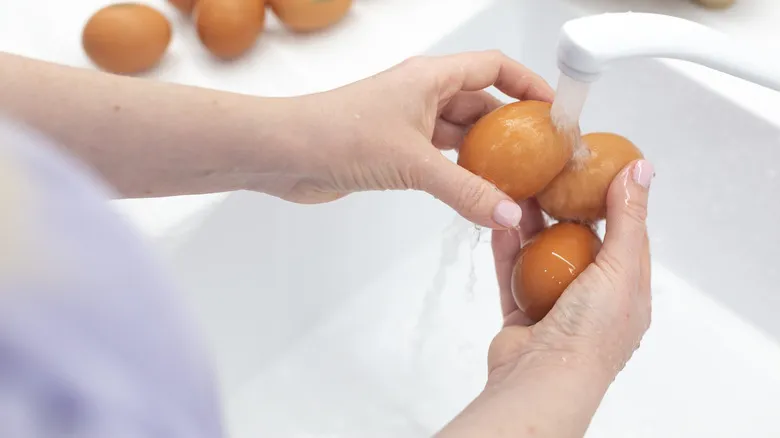How to properly clean your eggs

Here are some key guidelines to keep in mind when cleaning your farm-fresh eggs. First and foremost, only wash the eggs you plan to use right away. The eggshells are coated with a natural protective layer known as the "bloom," which helps block harmful bacteria from entering the shell and contaminating the egg inside. By preserving the bloom, you can store the eggs at room temperature for several weeks. If you've already washed your entire batch of farm-fresh eggs, don’t worry; you don’t have to discard them, but you should refrigerate them.
When you're ready to prepare breakfast, take a couple of those farm-fresh eggs and check them for any cracks or breaks. Next, rinse each egg under warm to hot water. Avoid using cold water, as it can cause the egg to contract, potentially allowing bacteria to enter the shell. During this process, remove any visible dirt or debris. You can use unscented dish soap for washing, but steer clear of scented soaps unless you want your breakfast to have a soapy flavor.
Next, create a sanitizing solution by mixing one tablespoon of bleach with one gallon of water. Carefully submerge each egg in this solution. Afterward, rinse the egg again, dry it with a paper towel, and you’re all set to cook.
If you wash eggs that you won’t be using right away, place them in a clean, unused carton and store them in the refrigerator. Remember to wash your hands thoroughly and sanitize the sink you used to prevent any contamination from harmful bacteria. By adhering to these proper washing methods, you can enjoy your farm-fresh eggs with confidence.
Recommended

What's The Best Way To Store Leftover Cake?

Why You Might Want To Avoid Ordering The Tuna Salad At Fast Food Restaurants

Cured Vs Brined Fish: What's The Difference?

The Best Ways To Store Trader Joe's Brined Half Turkey
Next up

